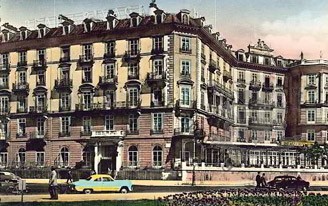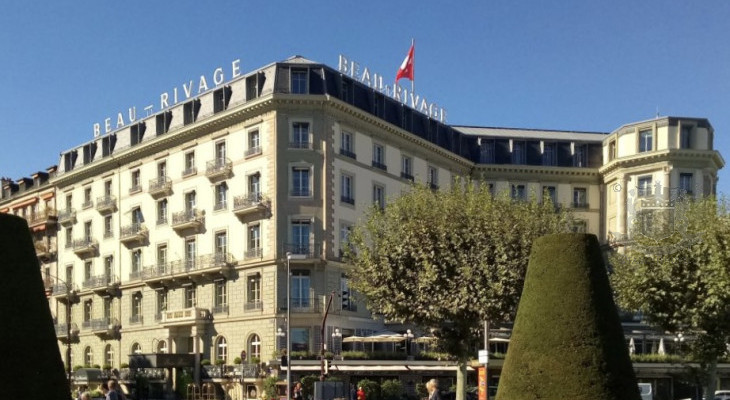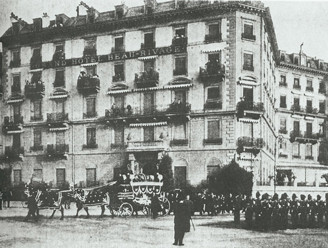

Since its opening on 13. April 1865, the Beau Rivage is one of the most important meeting places in a city that stands as a synonym for international relations: Geneva.
Beau Rivage
This historic hotel had is share of remarkable moments. It is of course a highly unpleasant affair that it is constantly associated with the death of leading personalities.
In 1873, Duke Charles of Brunswick died at the Beau-Rivage. His death was certainly considered a blessing as he bequeathed the fabulous sum of 20 million gold francs to the city (today 1 billion Francs).
A much more tragic event was the death of the idol of a generation, 60-years old Austrian Empress Elisabeth, who in 1898 died in the hotel.
After checking out from the hotel, she walked along the quay with her lady in waiting. She was on her way to a Lake Geneva Steamer to Montreux. Before she reached the boat she was stabbed by an Italian anarchist. Deathly wounded, she was carried back to the hotel where, within the same hour, she died. Today the hotel builds heavily on the marketing effect "Sisi" and offers – for example – Christmas dinners in her former suite.
And then ther are the seemingly never ending rumours about Uwe Barschel, the German politics shooting star who was found dead in the bathtub of his room on 11 October 1987. Circumstances doubtful - to say the least. The hotel's management sees no reason to advertise this tragedy. Barschel's room number has been eliminated
All these tragic events don't really have an influence on the Beau Rivage's reputation of being one of the best, most famous and certainly perfectly located grand hotels along the shores of this scenic Swiss lake.
In 1863, when London Banker William Currie started building it, the Beau Rivage had only seventy rooms and only eleven windows on the front which overlooked the lake (read more under "History").

The last journey of Empress Elisabeth of Austria started in Geneva in front of the Beau Rivage.
The Beau Rivage became the hotel of choice of many aristocrats. It was the centre of world politics and the meeting point of entire delegations. The late Emperor of Austria, Charles, spent months there with his family, so did many other monarchs and rulers, either in exile or in power.


THE 19th CENTURY
1865 Founding of the Hotel Beau-Rivage by Jean-Jacques MAYER, the great grandfather of the current owners.
1872 Geneva’s vocation as an international city is launched with the arbitration of the Alabama case, during which the British delegation was accommodated at the Beau-Rivage.
1873 Duke Charles of Brunswick dies at the Beau-Rivage and bequeaths the fabulous sum of 20 million gold francs to the city, which contributed towards the construction of several buildings, including the Grand Theatre.
1886 Charles-Albert MAYER succeeds his father.
1898 Empress Elisabeth of Austria dies at the hotel. After she had left the hotel she was stabbed by an anarchist.
THE 20th CENTURY
1905 Charles-Albert MAYER becomes chairman for the first time of the Geneva Association of Hotel-keepers.
1918 Czechoslovakia is born, and its ‘birth certificate’ is signed in the Beau-Rivage.
1918-1940 Between the two wars the stars of the stage mingle with the sovereigns in exile.
1940-1944 The hotel is closed during the war.
1965 The Beau-Rivage is taken over entirely by Fred and Janine MAYER.
1968-1970 A new catering complex is built, which includes LE CHAT-BOTTE gourmet restaurant, a BAR and three spacious banqueting halls. The rooms on the hotel’s Jura side are completely renovated.
1972 With its open-to-the-world attitude, the Beau-Rivage joins the SRS-WORLDHOTELS reservation system.
1978 The general management of the hotel is handed over to Jacques MAYER, 4th generation.
1983 The LE QUAI 13 restaurant is created. 1986 Hotel Beau-Rivage SA, Geneva, is founded as a fully-owned family concern.
1987 Sotheby's sets up its Swiss Head Office in the Beau-Rivage and inaugurates its sales by the historic auctioning-off of the Duchess of Windsor’s jewels.
1987 German politician Uwe Barsche is found dead in the bathtub of his room on 11 October 1987.
1986-1989 A large-scale investment programme is carried out with a view to upgrading the hotel installations, which include: - creating the Atrium bar in the Windsor salon, - completely redecorating one third of the rooms, - the inauguration of the entire ground floor by the symbolic turning-on of the Atrium fountain.
1990 Beau-Rivage celebrates its 125 years of existence by exhibiting its souvenirs, giving a sumptuous reception and with an open day, to the delight of more than 4,000 visitors. 1992 Beau-Rivage inaugurates a major apartment complex located next to the hotel, comprising furnished flats designed for rental through the hotel service, administrative areas, commercial arcades and underground garages.
1994-1996 Creation of junior suites and luxury rooms with views over the lake. The rooms occupied previously by King Louis II of Bavaria are renovated and upgraded with the latest in modern fittings, such as individual saunas and twin bubble-baths with also offer a spectacular view of Mont-Blanc. The new apartments are ‘inaugurated’ by His Royal Highness, Prince Philip of Edinburgh.
1997 A new telephone switchboard is put into service, providing clients with multimedia access.
1998 Beau-Rivage and the SISSI 1998 Association commemorate the 100th anniversary of the death of ‘Sissi’, Empress of Austria. A statue sculpted by the British sculptor, Philip Jackson, is erected on the Mont-Blanc rotunda and a major exhibition attracts over 10,000 Sissi fans.
1999 Pursuit of the renovation programme, comprising the embellishment of the CHAT-BOTTÉ gastronomic restaurant as well as the replacement of the Quai 13 restaurant by the PATARA Fine Thai Cuisine, managed by Patara (Geneva) S.A. – a Beau-Rivage partner and tenant at the hotel.
THE 21st CENTURY
2000-2001 The Atrium is completely restored to its original splendour and a fragment of the Pompeii fresco that decorated the hotel when it was built is rediscovered. The apartments previously occupied by Richard Wagner and King Alphonse XIII of Spain are restored and four business suites created.
2002 Chef Dominique Gauthier joins the hotel and confirms his original and innovative ideas at the Chat-Botté restaurant. Opening of a Business Centre and the launching of the hotel’s new website at www.beau-rivage.ch
2003 Creation of 21 new executive rooms, embellished once again by Mrs Leila Corbett, the British decorator. The rooms and suites are now fully equipped with broad band internet connexions providing guests with Virtual Private Network Connections (VPN) to their company networks. In addition, the hotel’s public areas, banqueting rooms and terraces offer the same connection possibilities, but this time as wireless interfaces. Dominique Gauthier, the hotel’s chef, is awarded the score of 16 out of 20 by GaultMillau Switzerland 2005.
2004 Renovation of the hotel’s main entrance, which is fitted with a marble staircase. Renovation of the conservatory and creation of a trompe-l’œil painting on the ceiling. New design of the terrace with, amongst others, the creation of a lounge area for the bar. Dominique Gauthier, the hotel’s chef, is awarded the score of 17 out of 20 by GaultMillau Switzerland 2005 as well as 3 chef’s hats. He is also nominated as Chef of the Year for West Switzerland.
2005 Completion of the Executive room renovation programme, comprising the installation of IP Cisco multi-service telephones with tactile colour screens and voice mailboxes. Inauguration of the new reception rooms, which have been soundproofed and fitted with state-of-the-art Bosch Security System Intellivox DDC public address systems. The Beau-Rivage celebrates its 140th Anniversary.
2006 The fitness centre opens to Beau-Rivage guests. The Windsor and Trémois rooms are renovated and redecorated by Mrs Elwes. The PATARA undergoes a revamp and remains Geneva's smartest and trendiest fine Thai restaurant.
2007 Installation of a state of the art media centre in the rooms: high-definition flat screens; access to a wide selection of films and newly released DVDs; jukebox with vast choice of CDs; direct Internet access with wireless keyboard.
THE TRAGIC END OF A LEGENDARY EMPRESS The following text was written by Fanny MAYER, wife of Charles-Albert MAYER, grandmother of the present owners-managers of the BEAU-RIVAGE. The original is preserved along with many other documents concerning this tragedy which have been reverently guarded to this very day in the private museum. Princess Elizabeth of Bavaria was born on December 24, 1837 at Possenhofen, married the Emperor of Austria in 1854, and died on September 10, 1898 at the age of 61. In 1897, Her Majesty the Empress had spent a week in Geneva. She was accompanied by the Baroness Mizzi Sennyez, his Excellency A. de Beszewiczy, Miss de Meissel and her retinue. Mr. Petrowsky was her private secretary. On September 9, 1898, she returned to Geneva by the one o'clock boat to visit Baroness de Rothschild. She was accompanied by Countess Irma Sztaray, her private secretary, Dr. Eugen Kromar, her chamberlain General Berzewiczy, her retinue. On their arrival, the two ladies strolled along the quay and then ate some ice cream, of which they were particularly fond. On returning to the hotel, the Empress spent a long time relaxing on the lounge balcony. In the words of the painter Vallotton, it was one of those beautiful evenings shimmering with light that turn the shores of Lake Geneva into a corner of Paradise. The following day, September 10, 1898 the Empress awakened very early. At her request, her breakfast was served with a selection of rolls of all shapes and flavours. After breakfast, she paid a visit to Bäker's music shop in the rue Bonivard, where she purchased a superb music box and several rolls of music. "The Emperor and the children will like them," she said. At 1:35 p.m., the two ladies left the hotel on foot to catch the boat. They walked along the quay, passing in front of the Brunswick Monument. Her servants had already left by train for Territet, by order of the Empress, who said "I do not like processions". As the ship's bell announced the departure, a stranger came toward them, approached the Empress, struck her, and fled. Elizabeth collapsed. On hearing the Countess's cries, people came running. A coach-driver helped the unknown woman to stand on her feet. He then alerted the hotel concierge, an Austrian by the name of Planner, who had been watching the Empress as she made her way to the boat. He came running. The Empress was standing up. The coach-driver brushed down the unknown woman's clothes. "It is nothing" she repeated, "we must hurry or we shall miss the boat". As she walked to the jetty, the Empress remarked to the Countess de Sztaray, "I wonder what that man wanted. Perhaps he was trying to steal my watch". At his juncture, Planner arrived and informed them that the offender had been apprehended. After striking his blow, he had escaped toward the rue des Alpes. As he fled, he threw his home-made wooden-handled stiletto into the entrance to No. 3 rue des Alpes, where it was found next morning by the concierge during his morning cleaning. Passers-by ran after the offender. A workman coming the opposite way grabbed Luccheni. He was then arrested by a policeman, who led him to the Hotel through the rear courtyard, followed by a small crowd. He was interrogated but refused to answer, adopting a fierce and cynical air. My husband was completely exasperated and dealt him a violent blow across the mouth. A young Austrian Baron staying at the hotel would have hurled himself at Luccheni, but was restrained by the policeman, who took charge of the prisoner and marched him off to the police station. Meanwhile, the Empress had boarded the boat. Just as she arrived on the bridge, she staggered and fainted. On reviving, she tanked a lady who had helped the Countess lift her up, and then fainted again. The Countess opened the Empress's blouse and noticed a small wound in the region of the heart filled with a droplet of blood. The boat had cast off and was sailing out of the harbour, when the captain learned the identity of his lady passenger. He turned the boat round and drew alongside the landing stage in front of the Hotel. The Empress was laid on an improvised stretcher made with a sail placed over six oars and some cushions. Six boatmen carried her to the hotel with a small group of people in their wake. The head of staff of the hotel held her hand which was dangling limply. Everyone was completely panic-stricken, their faces filled with sorrow and dismay. I walked alongside this sad escort until we reached her suite. Dr. Golay was called for but was unable to save her. The internal bleeding evidenced by the blood stain was increasing. Today there is an operation for closing a heart wound, but in 1898 it was out of the question. In any case, the Emperor's permission would have had to be obtained. The Empress had the death rattle when she arrived at the Hotel and passed away about 20 minutes later. Countess Sztaray closed her eyes and folded her hands. A priest was present. I stayed with Countess Sztaray until the royal suite arrived 6 hours later. The Empress was embalmed and placed in her coffin that evening. The Countess presented me and my husband with a rose, which she took from the open coffin. I treasure it, along with a small bloodstained piece of mauve ribbon. Today the blood has disappeared. (This tragedy occurred 50 years ago, but I remember it as vividly as if it were yesterday.)